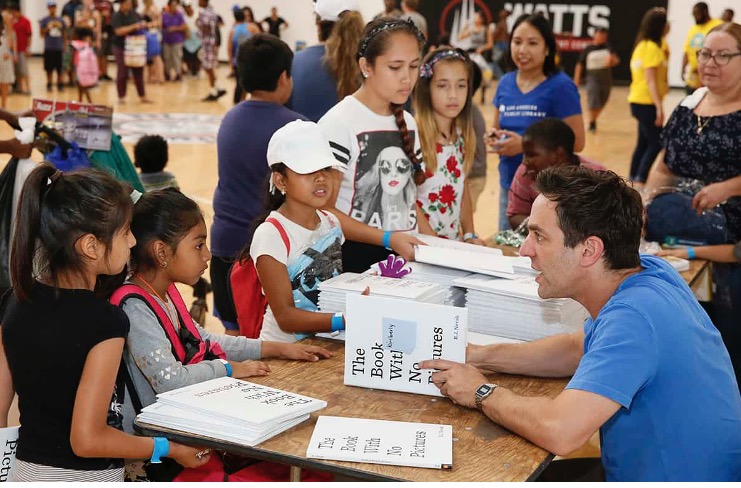CommentsACCORDING TO LIZ - “A country that was founded on the principles of free speech, free press, and the freedom of religion — all rights tied inexorably to words — is fast becoming an illiterate nation.” – from the website of David Baldacci’s WishYouWellFoundation.org
The sad truth is that over half of the adults living in the United States – about 130 million people, or 54% of those aged 16 to 74 – lack the basic proficiency to read and comprehend at a sixth-grade level.
This total breaks down into over 50 million people, one-fifth of all adult Americans, who possess literacy skills defined as "Level 1" – meaning they can’t fill out a job application, understand labels on prescribed medications, or read to their children. More than 60% of these did not complete high school.
But literacy is more than just reading and writing. The Organization for Economic Cooperation and Development defines literacy as “understanding, evaluating, using and engaging with written text to participate in society, to achieve one’s goals and to develop one’s knowledge and potential.”
So the 80 million Americans, one-third of the adult population, who are rated “Level 2” – able to perform basic tasks such as reading and responding to basic written words – still lack the higher-level reading and problem-solving skills required for promotions or virtually any job other than menial labor.
If people can’t read, or can only read haltingly, how can they research, comprehend and integrate what underlies the complexities of our modern life?
How can they even understand our nation’s problems, let alone parse between factual and misleading politicians and news hosts what choices are best for them and their families?
Low literacy is a factor in social isolation, bullying by peers and co-workers, and frustration which can lead to violence within and outside of the home.
Reading and discussing a variety of books and articles with others creates an ongoing interest in ideas and love for reading.
“No Child Left Behind” was to foster that interest.
Education for all of us, children and especially adults, need to move away from rote memorization of facts and the parroting of political memes and focus on learning how to think, how to interpret what is being said and how it will affect our lives and our futures.
There is a direct link between low literacy skills and poverty, between low literacy skills and high-risk births, and between high-risk births and the ability to learn well.
And there is an undeniable link between low literacy skills and increased healthcare costs, drug addiction, and crime.
Two years ago a Gallup study found that these low levels of literacy cost the American economy over $2 trillion annually, or 10% of the GDP.
In Los Angeles, another study showed that bringing all adults up to just a sixth grade reading level would increase the City’s income by a similar 10%.

The National Center for Education Statistics reported that 33.5% of the population 16 years and over in Los Angeles County lacked basic prose literacy skills in 2003. And that was an increase from 20.4% in 1992. Not good.
In more recent America’s Most Literate Cities studies ranking the largest cities (population 250,000 and above) in the United States by literacy, Los Angeles has scored as high as 53 (2007) and as low as 68 (2018) out of the 80-odd cities rated.
New York came in 20th. Other California cities - San Francisco, Oakland, San Diego, Sacramento, San Jose and Santa Ana – also ranked above Los Angeles.
Over 23% of adults in California lack rudimentary English reading and writing skills – the lowest literacy rate in the nation. A shocking 25% of our six million students don’t have basic reading proficiency.
Decades of underspending in schools, culture battles over bilingual education and stark income inequality have made California the least literate state in the nation.
California is the 5th largest economy in the world and is currently sitting on a surplus bigger than the entire budgets of many other states, yet our state is 46th in the nation in per pupil spending at approximately $11,000 per student per year.
Additionally, California has notoriously underfunded and neglected schools in Black and Latino communities. Across-the-board, our state spends about 13% less than the national average on K-12 schools. This has gone on for too long.
Recent research shows that even California’s better-performing students have poorer outcomes on standardized tests than their counterparts in states with higher literacy.
Yes, our state has the most diverse population in the country. More than 200 languages are spoken here. But is that a legitimate excuse, or just a challenge to be met?
The United States legally welcomes about two million immigrants a year; about 50% of whom lack high school education and proficient English language skills. A significant number come to the Golden State along with a larger percentage of undocumented and temporary workers, so California’s numbers probably skew much higher.
Programs to bring the children of people who don’t speak English at home up to the level of their peers have been less than stellar and that’s a significant problem in a state with over a million English learners among its six-million strong student population.
Right now the United States, like nations everywhere, faces long-term challenges stemming from the pandemic – a weakened economy, a paucity of good jobs, time lost in the classroom that especially impacted the neediest students, and a generally unmet need for a robust resolution of racial injustice.
More importantly, California also has one of the biggest wealth chasms.
To change that, California needs to take immediate steps to propel the state out of rock-bottom last place in literacy.
Eradicating illiteracy would not solve every problem, but it would help make substantial progress towards reducing inequality in the long-term and give a much-needed boost to local and regional economies in Los Angeles, in California and, yes, throughout the country.
(Liz Amsden is a contributor to CityWatch and an activist from Northeast Los Angeles with opinions on much of what goes on in our lives. She has written extensively on the City's budget and services as well as her many other interests and passions. In her real life she works on budgets for film and television where fiction can rarely be as strange as the truth of living in today's world.)






